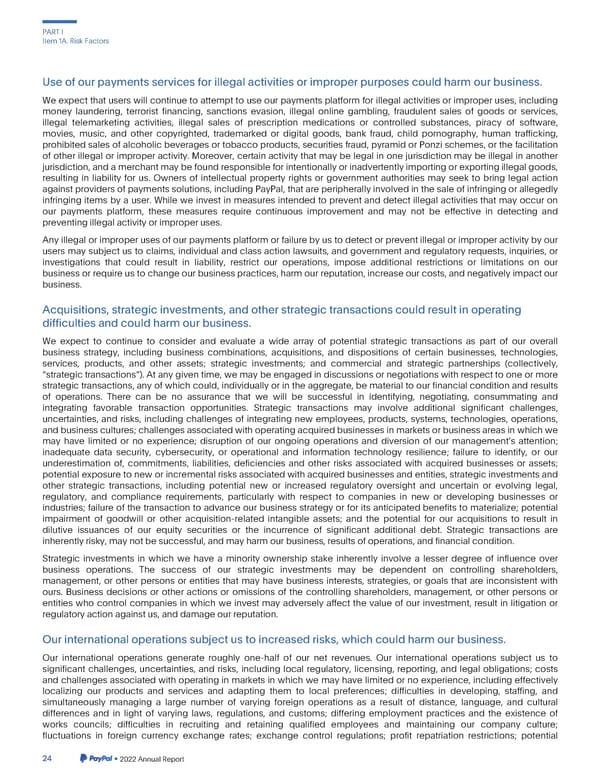PARTI Item1A.RiskFactors Useofourpaymentsservicesforillegalactivitiesorimproperpurposescouldharmourbusiness. Weexpectthatuserswill continue to attempt to use our payments platform for illegal activities or improper uses, including money laundering, terrorist financing, sanctions evasion, illegal online gambling, fraudulent sales of goods or services, illegal telemarketing activities, illegal sales of prescription medications or controlled substances, piracy of software, movies, music, and other copyrighted, trademarked or digital goods, bank fraud, child pornography, human trafficking, prohibited sales of alcoholic beverages or tobacco products, securities fraud, pyramid or Ponzi schemes, or the facilitation of other illegal or improper activity. Moreover, certain activity that may be legal in one jurisdiction may be illegal in another jurisdiction, and a merchant may be found responsiblefor intentionallyor inadvertentlyimporting or exportingillegal goods, resulting in liability for us. Owners of intellectual property rights or government authorities may seek to bring legal action against providers of payments solutions, including PayPal, that are peripherally involved in the sale of infringing or allegedly infringing items by a user. While we invest in measures intended to prevent and detect illegal activities that may occur on our payments platform, these measures require continuous improvement and may not be effective in detecting and preventingillegal activity or improper uses. Anyillegal or improper uses of our payments platform or failure by us to detect or prevent illegal or improper activity by our users may subject us to claims, individual and class action lawsuits, and government and regulatory requests, inquiries, or investigations that could result in liability, restrict our operations, impose additional restrictions or limitations on our businessorrequireustochangeourbusinesspractices,harmourreputation,increaseourcosts,andnegativelyimpactour business. Acquisitions,strategic investments,andotherstrategictransactionscouldresultinoperating difficulties and could harm our business. We expect to continue to consider and evaluate a wide array of potential strategic transactions as part of our overall business strategy, including business combinations, acquisitions, and dispositions of certain businesses, technologies, services, products, and other assets; strategic investments; and commercial and strategic partnerships (collectively, “strategic transactions”). At any given time, we may be engaged in discussions or negotiations with respect to one or more strategic transactions, any of which could, individually or in the aggregate, be material to our financial condition and results of operations. There can be no assurance that we will be successful in identifying, negotiating, consummating and integrating favorable transaction opportunities. Strategic transactions may involve additional significant challenges, uncertainties, and risks, including challenges of integrating new employees, products, systems, technologies, operations, andbusinesscultures;challengesassociatedwithoperatingacquiredbusinessesinmarketsorbusinessareasinwhichwe may have limited or no experience; disruption of our ongoing operations and diversion of our managements attention; inadequate data security, cybersecurity, or operational and information technology resilience; failure to identify, or our underestimation of, commitments, liabilities, deficiencies and other risks associated with acquired businesses or assets; potential exposure to new or incremental risks associated with acquired businesses and entities, strategic investments and other strategic transactions, including potential new or increased regulatory oversight and uncertain or evolving legal, regulatory, and compliance requirements, particularly with respect to companies in new or developing businesses or industries; failure of the transaction to advance our business strategy or for its anticipated benefits to materialize; potential impairment of goodwill or other acquisition-related intangible assets; and the potential for our acquisitions to result in dilutive issuances of our equity securities or the incurrence of significant additional debt. Strategic transactions are inherently risky, may not be successful, and may harm our business,results of operations,and financial condition. Strategic investments in which we have a minority ownership stake inherently involve a lesser degree of influence over business operations. The success of our strategic investments may be dependent on controlling shareholders, management, or other persons or entities that may have business interests, strategies, or goals that are inconsistent with ours. Business decisions or other actions or omissions of the controlling shareholders, management, or other persons or entities who control companies in which we invest may adversely affect the value of our investment, result in litigation or regulatoryactionagainstus, anddamageourreputation. Ourinternationaloperationssubjectustoincreasedrisks,whichcouldharmourbusiness. Our international operations generate roughly one-half of our net revenues. Our international operations subject us to significant challenges, uncertainties, and risks, including local regulatory, licensing, reporting, and legal obligations; costs and challenges associated with operating in markets in which we may have limited or no experience, including effectively localizing our products and services and adapting them to local preferences; difficulties in developing, staffing, and simultaneously managing a large number of varying foreign operations as a result of distance, language, and cultural differences and in light of varying laws, regulations, and customs; differing employment practices and the existence of works councils; difficulties in recruiting and retaining qualified employees and maintaining our company culture; fluctuations in foreign currency exchange rates; exchange control regulations; profit repatriation restrictions; potential 24 •2022AnnualReport
 2023 Annual Report Page 171 Page 173
2023 Annual Report Page 171 Page 173